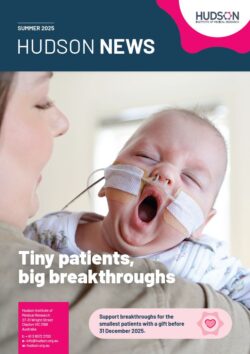Associate Professor Phillip Berger is a member of The Ritchie Centre.

Biography
Associate Professor Berger’s work is directed at the respiratory system with a particular focus on control of breathing. The intention of all his research is to develop a rigorous mathematical understanding of how the system operates, and to use this knowledge to create new therapies and devices that effectively treat the respiratory disorders that bedevil humans right across the age spectrum, from the preterm newborn with recurrent apnea and profound arterial oxygen desaturation, to the adult with heart failure and repetitive central sleep apneas lasting half a minute or more.
A/Prof Berger’s publications have provided a number of insights into developmental and disease-related changes in the complex control system for breathing:
- Acceleration of chemoreceptor transduction underlies the observation that periodic breathing, recurrent apnea, and arterial oxygen desaturation occur in infants, with the peak incidence occurring at three months of age when the incidence of SIDS is highest.
- Enhancement of chemoreceptor sensitivity or gain, both spontaneously as in early postnatal life and as a result of heart failure, or through pharmacological means, promotes wild fluctuations in breathing that include apnea.
- Dynamic changes to arterial, venous and alveolar oxygen stores during isolated and repetitive apneas explain the rapidity with which arterial oxygen levels can fall in preterm infants, rendering them prone to dangerously low levels of tissue oxygenation particularly during sleep.
- New medical devices have to date emerged from my laboratory’s work, one a monitor of lung gas volume, the other a monitor of upper airway patency in patients, provide practical means for monitoring and providing treatment to patients with sleep apnea: commercial development of these devices is ongoing.
Publication highlights


